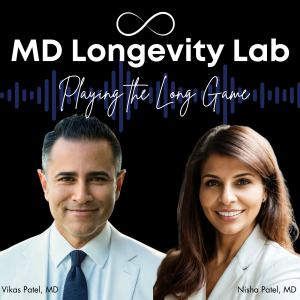
Thursday Oct 30, 2025
15. Protein 101: From Outdated Guidelines to Optimal Healthspan & Longevity
Protein isn’t just for bodybuilders — it’s the longevity macronutrient. In this episode, Drs. Nisha and Vikas Patel break down why protein is essential for muscle, metabolism, and long-term health — and how outdated dietary guidelines have been underselling its importance for decades.
From the science of muscle protein synthesis and turnover to practical strategies for hitting your protein goals (without turning your life into a spreadsheet), this episode separates myth from mechanism and gives you a roadmap for optimizing your nutrition for healthspan.
The Role of Protein in Longevity
Protein is more than a muscle nutrient — it’s a marker of aging and resilience. Higher lean body mass predicts lower risk of cardiovascular disease, dementia, and all-cause mortality. Your body replaces roughly 250–300 grams of protein daily through constant turnover. Without enough dietary intake and resistance training, that process breaks down, leading to loss of function and vitality over time.
Why the RDA Is Outdated
That familiar 0.8 g/kg recommendation? It was based on old data aimed at preventing malnutrition, not optimizing health. Most adults need closer to 1–1.6 g/kg, or roughly 1 gram per pound of ideal body weight. Too many adults over 40 barely hit the minimum, leading to preventable loss of lean mass, slower metabolism, and higher visceral fat. Aging isn’t the only culprit — under-protein-ing and under-movement are.
Protein and Metabolism
Protein burns more calories to digest than carbs or fats, and muscle acts as a glucose sponge, stabilizing blood sugar and reducing inflammation. It also improves satiety by regulating hunger hormones, so before you reach for appetite suppressants, check your plate — protein first makes a big difference.
Plant vs. Animal Protein
Animal proteins contain all nine essential amino acids, especially leucine, which triggers muscle protein synthesis. Plant-based diets can work beautifully too — they just require more planning and variety. Combine lentils with quinoa, beans with rice, or tofu with edamame to get a complete amino acid profile. A “climate-conscious omnivore” approach can balance health, ethics, and sustainability.
Myth Busting
High protein doesn’t damage kidneys in healthy individuals.
You can absorb more than 30 grams per meal — that number just refers to the amount that maximally stimulates muscle building.
And no, protein won’t make you bulky — you’d need years of heavy training for that.
Protein Timing and Real-World Tips
Consistency matters more than timing. Hitting your daily protein goal within 24 hours of a workout is what counts — not whether you drink a shake within an hour. Whey protein powder might be technically “ultra-processed,” but it’s a functional one — a tool to help you meet your goals efficiently.
Real Talk: Balance and Longevity
Most adults under-eat protein and overeat processed carbs. The result is fatigue, poor recovery, more visceral fat, and faster muscle loss. Focus on building your plate intentionally — start with a palm-sized portion of protein, then veggies, then carbs. For those in their 40s and beyond, this is especially crucial. Older adults need more protein, not less, to offset anabolic resistance. For women, especially post-menopause, adequate protein supports bone density, muscle retention, and metabolic health.
Practical Takeaways
Aim for around 1 gram of protein per pound of ideal body weight.
Distribute it evenly across your meals — 30 to 40 grams each.
Pair it with regular resistance training for the biggest payoff.
Choose quality over perfection — whole foods first, supplements as needed.
Longevity is about progress, not perfection.
Closing Thoughts
The RDA is outdated. Aim higher, eat intentionally, and think long-term. You don’t need to be perfect — you just need to be consistent. Longevity isn’t about restriction; it’s about fueling your future.
Get in touch
Follow us on Instagram @MDLongevityLab and share this episode with someone who still skips breakfast — because you’re not saving calories, you’re just starving your muscle. Visit us at www.mdlongevitylab.com
No comments yet. Be the first to say something!